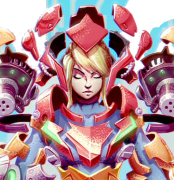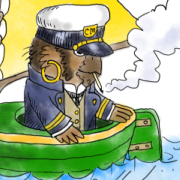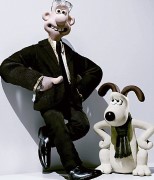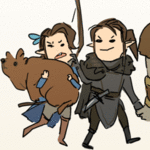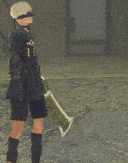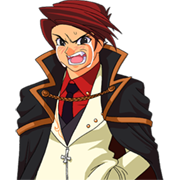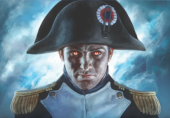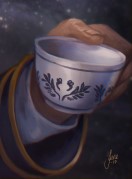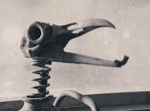|
Sunning posted:There are also references to racial segregation in the America. For example, Jim Crow law (including an actual murder of crows) and KKK imagery are seen in video #3. Going back to Mormonism, the song featured in this game, "God Only Knows", was the theme for HBO drama, Big Love. I don't know whether it's a coincidence or an in-joke. All I took away from the God Only Knows thing is that I've had the song stuck in my head for the last month. drat the Beach Boys. But I'm referring more to the religious side of things than the racism. I think that's just the writing giving Columbia a reason to be so insular. It goes back to the fascism being the ultimate result of "We're number one!" What I was more wondering was whether the game is pulling a better executed MDickey or playing it fast and loose with Mormon stereotypes. They're pretty close to reality on the racist front so I wondered if they were doingthe religion any sort of justice. Seems like they're doing a good job to outside eyes, but I wondered whether they were perhaps intentionally getting something really central to you wrong or if perhaps they might be doing that on purpose so it doesn't create controversy.
|
|
|
|

|
| # ? Jun 9, 2024 08:56 |
|
Abilifier posted:I just read about Wounded Knee on Wikipedia. Was this covered in the thread yet? Because that little bit of history really adds a lot to the characters of Slate, Booker, and Comstock. I'll add a quick summary if it seems appropriate. It has not and oof, is it nasty. Having been both there and with the Pinkertons it's not surprising that the office flashbacks (hallucinations or whatever you wanna call them, definitely some dream/nightmare and reality intermixed) show him sitting there staring at a bottle.
|
|
|
|
Bruceski posted:It has not and oof, is it nasty. Having been both there and with the Pinkertons it's not surprising that the office flashbacks (hallucinations or whatever you wanna call them, definitely some dream/nightmare and reality intermixed) show him sitting there staring at a bottle. It's pretty appalling just how much Comstock rewrote history there, he literally reversed the roles played by the Indians and the Cavalry. I haven't taken American history (or any history) since high school, and that was over 10 years ago, so I don't really remember the details of the Wounded Knee incident, but it really does explain Booker's mental state. He could be suffering from some PTSD and his drinking, running up debts, and now going on a hopeless mission could be his own way of trying to kill himself. I'm still playing though, I'm only a little bit further ahead than Sundowner, so I'm sure more nasty and depressing revelations lie ahead.
|
|
|
|
It's interesting how they used the Boxer Rebellion as the major area of 'jingoistic fervor' for Columbia, although I guess there weren't many other major international incidents at that time that involved the U.S., or at least U.S. citizenry. Alas, I'm not an expert on either U.S. and the world at that time, or indeed the Rebellion of the Harmonious Fists, so I can;t comment any further, really... I guess it must also be pointed out that Comstock REALLY doesn't go for subtlety. Hell, most of the aesthetics in this game are outrageously bombastic - to a patronising, almost disgusting extent. I guess that is supposed to give feeling for 'ye olde propoganda', but I can't help but feel the game designers are essentially picking you up by the lapels, screaming 'HEY DID YOU SEE THIS?! BOY, THAT'S CERTAINLY A SET-PIECE AND TELLS A STORY!'. It's not like in Bioshock, when [spoilers]you find the bodies of that Jewish/Polish couple who commit suicide after they realise that their daughter was turned into a little sister[/spoilers], although I guess even THAT wasn't subtle. Maybe it is due to the lighting? Hmmm. Oh yes! As an aside, something that I read in the Freeper thread of D&D which I think might be of an interesting aside as a little illustration of just how horrible old America could be - Octoroon balls! Like Miss Universe competitions, except whereby non-full black women could be granted social privilages through their beauty and beocming a mistress to more well-off whites. So ingrained was it in certain areas of Southern culture, they even had speific music for it!
|
|
|
|
Sundowner, I wouldn't edit out the scavenging runs. For my playthrough, that was the true essence of this game: constantly rifling through garbage cans and desks looking for hot dogs to eat. It's why I quit playing, actually. It's just so anti-thematic that it absolutely ruined what the game was going for (to me, anyway). I will say that looting corpses makes more sense in this game than in most. A lot of characters, including Slate in this update, want to paint Booker as this murderous psychopath, and corpse looting works to that end.
|
|
|
|
After a point what use is there in seeing me mash the interact button over a pile of dead bodies for ~30 seconds at a time?
|
|
|
|
Comstock trying to take credit for battles he wasn't involved in annoys the poo poo out of me. Not for any moral reasons but because it's such a loving stupid thing to do. If Slate and what appears to be every surviving soldier that was actually at those battles is in Columbia, why would you ever think it was a good idea to lie about being there while surrounded by people who could call you out on it? Oh sure, the average Columbian is going to take their Prophet's word over anybody else's but why would you even set yourself up for that kind of risk? And speaking of risks and set ups - a one week gestation period? Sounds like Comstock got frisky with some other lady and his wife helped him cover it up. Such godly behavior.
|
|
|
|
CuwiKhons posted:Comstock trying to take credit for battles he wasn't involved in annoys the poo poo out of me. Edit: even in tags, that apparently goes against the spoiler policy. Never mind. Kopijeger fucked around with this message at 23:29 on Oct 5, 2013 |
|
|
|
It always makes me laugh when Slate calls Booker a killer just like him after setting a load of guys on him who run in guns blazing giving you no choice but to kill them, I mean, I get where Slate is coming from, its just rather amusing at the time he chooses to say it.
|
|
|
|
I love how frustrated Elizabeth sounds when she says she wanted a puppy, but never got one. You can tell that's been stewing for a while. Who would she even ask about getting one? Songbird?
AndwhatIseeisme fucked around with this message at 23:30 on Oct 5, 2013 |
|
|
|
Why do I get the feeling that Lady Comstock wasn't being at all genuine? It's almost like her voxophone was trying to fool me.
|
|
|
|
Going back to a previous post, I think the Battle of Wounded Knee plays a bigger role in everything going on in this game than people realize. It's been interwoven either subtly (the military honors on the wall at the very beginning) or very obviously (Quest for Shock Jockey) throughout and has never been far from the forefront. Booker's not a talkative sort but you can tell he's not happy that it keeps coming up, and he seems to feel about the same about his distinguished service as he does about his cracking the skulls of the poor as a Pinkerton.Abilifier posted:I just read about Wounded Knee on Wikipedia. Was this covered in the thread yet? Because that little bit of history really adds a lot to the characters of Slate, Booker, and Comstock. I'll add a quick summary if it seems appropriate. Please do, it's not really a "battle" and if most people don't know about it, it'll be pretty jarring compared to how it's portrayed in this.
|
|
|
|
Epic High Five posted:
quote:The Wounded Knee Massacre occurred on December 29, 1890, near Wounded Knee Creek on the Lakota Pine Ridge Indian Reservation in South Dakota, USA. It was the last battle of the American Indian Wars. On the day before, a detachment of the U.S. 7th Cavalry Regiment commanded by Major Samuel M. Whitside intercepted Spotted Elk's band of Miniconjou Lakota and 38 Hunkpapa Lakota near Porcupine Butte and escorted them five miles westward (8 km) to Wounded Knee Creek, where they made camp. I also saw this quote from L. Frank Baum, you know, the guy who wrote The Wizard of Oz quote:The Pioneer has before declared that our only safety depends upon the total extermination of the Indians. Having wronged them for centuries, we had better, in order to protect our civilization, follow it up by one more wrong and wipe these untamed and untamable creatures from the face of the earth. In this lies future safety for our settlers and the soldiers who are under incompetent commands. Otherwise, we may expect future years to be as full of trouble with the redskins as those have been in the past. Edit: Here's another link, and it includes an eyewitness account from one of the US soldiers. http://www.eyewitnesstohistory.com/knee.htm Abilifier fucked around with this message at 00:19 on Oct 6, 2013 |
|
|
|
Judge Tesla posted:It always makes me laugh when Slate calls Booker a killer just like him after setting a load of guys on him who run in guns blazing giving you no choice but to kill them, I mean, I get where Slate is coming from, its just rather amusing at the time he chooses to say it. Slate's whole thing here always seemed kind of dumb to me. Like, sure, I get the whole "I want my soldiers to die honourably without giving Comstock the satisfaction" thing on the face of it, but Booker's a friend of his who could very well provide a big help if not hosed with and Slate just asked, maybe enough to turn the attack on the Hall of Heroes into some semblance of a winnable battle - Booker'd already shot his way through the entire besieging force to get here after all. Sending his whole army to commit suicide-by-Booker the second the guy steps inside just never really made a whole lot of sense, and felt kind of forced. At worst, it makes Slate a lovely commander who throws his troops' lives away when they'd probably rather live if there's a chance to.
|
|
|
|
Abilifier posted:I also saw this quote from L. Frank Baum, you know, the guy who wrote The Wizard of Oz Here's the full text of Baum's editorials for Wounded Knee and Sitting Bull's death, taken from http://hsmt.history.ox.ac.uk/courses_reading/undergraduate/authority_of_nature/week_7/baum.pdf quote:The Sitting Bull Editorial quote:The Wounded Knee Editorial Hard to pin doiwn a man's mind a hundred and twenty-five years after the fact, but it sounds like someone disgusted at what had been done, but who felt that there was no way to redeem the Sioux.
|
|
|
|
Flesnolk posted:Slate's whole thing here always seemed kind of dumb to me. Like, sure, I get the whole "I want my soldiers to die honourably without giving Comstock the satisfaction" thing on the face of it, but Booker's a friend of his who could very well provide a big help if not hosed with and Slate just asked, maybe enough to turn the attack on the Hall of Heroes into some semblance of a winnable battle - Booker'd already shot his way through the entire besieging force to get here after all. Sending his whole army to commit suicide-by-Booker the second the guy steps inside just never really made a whole lot of sense, and felt kind of forced. At worst, it makes Slate a lovely commander who throws his troops' lives away when they'd probably rather live if there's a chance to. I'm not so sure they want to keep going. The entire city thinks them liars and frauds, because who's going to disbelieve the prophet. They're not a part of the Comstock cult, they just got stuck there after they attacked Nanking without Washington's approval, and Columbia seceded from the union, meaning they would be labeled traitors if they ever went back to America. So being Patriots of the maximum variety, they're screwed. Add in that they had to keep their uniforms and guns hidden, and hidden in Vox Populi hideouts no less, must mean they can't even be a part of the society they seceded from America into. And being Jingoistic military types of 1910's America, they probably hate the Vox as much as Comstock, and are at the end of their ropes. That and they're trapped there, after a lost battle, falling back and back into the museum as a couple dozen soldiers try to hold out against all of Columbia's forces, that you had to kill your way through just to get inside, because the enemy's already at the doorstep. No way out, no reinforcements, no future but rotting slowly to death in a prison cell, so might as well go out with a bang. It's not the soundest reasoning, but then again they are fighting because they are PROUD of what they did at Wounded Knee and Nanking, and WANT people to know about it. They're not exactly a mighty military power to be reckoned, or right headed strategists, when their great plan was to attack a tourist attraction, with no exit strategy or actual further plans. Either crazies, or more likely, knew it was suicide and that was the point.
|
|
|
|
Most games would use this as something to bolster the player's spirit, to give them a lively fight with (doomed) allies who are clearly on the right side (ie, your side) of things before moving on to the next area. BS:I instead uses it as another way to highlight how messed up everything is. Slate and his men are basically just the unruly military arm of Comstock's paradise, only now they're not needed. They're not good people - they're awful, horrible monsters who have gone a bit crazy under the weight of some stupid decisions and circumstances and now see no other way out. I'm no historian, but considering the circumstances of Wounded Knee and the Boxer Rebellion, I had zero qualms about killing every last bastard in that hall. It's way harder to justify killing the countless police that the player has killed up to this point (you see, I suffer from NPC Empathy Syndrome and feel bad about killing supposed "bad guys" who are just grunts doing the best they can until a confused, possibly psychotic mass murderer crosses their path) than it is the soldiers. Slate is a bit weird, but Slate is a bloodlust fueled crazy mass murderer who has been totally enabled in this his whole life. Now his balls have been cut off and this seems like the only real option to go out with "honor"
|
|
|
|
Abilifier posted:I am by no means an expert on American history, I haven't taken any classes since high school and that was over 10 years ago. I'm pretty sure I learned about Wounded Knee but I had to look it up in Wikipedia to remember anything. Anyway, I know it's kind of Thanks for this; it really does put things in perspective. Shows how horrible and disingenous it is for Slate to say he "strode that battlefield like the heroes of Sparta." To add to this, that the massacre happened at all was just a misunderstanding between parties. You recall Slate using the term "Ghost Dancers?" That was a name given to a religious movement that occured when Wovoka of the Paiute had a vision of Jesus Christ- yep, that one- returning to the earth as a Native American. He woulkd raise all his believers up to heaven- kinda like the Rapture, only he'd put them back on earth, a promised land with plentiful animals to hunt, no white oppressors, and the ghosts of the ancestors walking the earth. Several people performed this dance throughout the great plains. Really, you'd think people would be happier about that- hey, we've spread Christianity, right? But they saw all these dances, they thought it was some freaky war dance, and even though there were no documented attacks of any white person or their property, the Army still thought it ought to disarm all the Native Americans doing this dance, just to be sure. (I wonder where the Second Amendment protestations were then?) Another thing you should know: of the band of 350 or so Lakota that Forsyth detained, only 120 were men; the rest were women and children. And among those men, only 38 rifles were found. Tensions mounted, someone tried to perform the Ghost Dance, a shot was fired and, well... well.  To be fair, there was one commanding officer (General Neson Miles, who was pretty cool about the Natives, actually; he'd sent a telegram lamenting their poor treatment and how we should really give them what we promised a few days earlier) who was just horrified by the whole thing, and tried to punish Col. Forsyth by stripping him of his rank. However the Court of Inquiry, although they criticized his tactics, exonerated him, and Forsyth went on to be a Major General. And 20 soldiers got Medals of Honor too. Booker probably has one. To be fair, there was one commanding officer (General Neson Miles, who was pretty cool about the Natives, actually; he'd sent a telegram lamenting their poor treatment and how we should really give them what we promised a few days earlier) who was just horrified by the whole thing, and tried to punish Col. Forsyth by stripping him of his rank. However the Court of Inquiry, although they criticized his tactics, exonerated him, and Forsyth went on to be a Major General. And 20 soldiers got Medals of Honor too. Booker probably has one.
|
|
|
|
resurgam40 posted:Booker probably has one. If he does, it's not on display.  http://en.wikipedia.org/wiki/Medal_of_Honor#Historical_versions Though to be fair, from what we've learned of him so far, it wouldn't be on display if he'd got one
|
|
|
|
I'm surprised Booker has any of his army stuff up at all considering how (rightly) ashamed he seems to be of his participation in Wounded Knee.
|
|
|
|
It probably helps to have that out there when he's trying to land a job.
|
|
|
|
 Holy poo poo, this game really does smack you in the face with racism. Holy poo poo, this game really does smack you in the face with racism.Slate somehow manages to be as disgusting as Comstock.  Comstock doesn't recognize the sacrifice 30 of my comrades made while we were joyfully slaughtering the people of Peking! Comstock doesn't recognize the sacrifice 30 of my comrades made while we were joyfully slaughtering the people of Peking!late edit: grammar my dad fucked around with this message at 12:21 on Oct 6, 2013 |
|
|
|
Round 7, ladies and gentlemen, round 7:
GenHavoc fucked around with this message at 12:08 on Oct 6, 2013 |
|
|
|
Looking closely at the stuff Elizabeth pulls through the tears is remarkably interesting. That turret seems to be from somewhere surrounded by ruins draped in red banners.
|
|
|
|
GenHavoc posted:Slate seems to be obsessed with Tin Soldiers. How they don't fight wars, how his men may be slain by them. Could just be a euphemism for Comstock's religious police. Or maybe... "Tin Soldier" is slang for someone who likes playing soldier. In context, Slate's just saying that Comstock likes taking the credit for the effort of the soldiers who actually did something. I'm sure if we're going to get an answer for this, it'll come next update, but I'm curious as to what Booker's actual involvement was at Wounded Knee. Based on Slate's comments about "the hero takes no praise" or however it was said, I'm wondering if Booker was one of the reasons for the victory at Wounded Knee in this timeline? Considering how he said he hates what he did, wouldn't surprise me. (Also, I don't remember, was there any form of confirmation whether he was involved in The Boxer Rebellion or not?)
|
|
|
|
bobbertoriley posted:"Tin Soldier" is slang for someone who likes playing soldier. In context, Slate's just saying that Comstock likes taking the credit for the effort of the soldiers who actually did something. Given that the Boxer Rebellion took place as Columbia's last action as an American city, and afterwards disappeared into the sky, I find it unlikely he was present there. As well, I'd think if he was, there's be more allusions to it, as there have been with him and Wounded Knee.
|
|
|
|
I wish they had in some way added in more of the actual history into the game itself. If you aren't from the US or a history buff, you miss a lot of the meaning of Comstocks (and Slates) version of the events. If I had been playing, I would probably have looked the actual events up, but I have a feeling most wouldn't bother, not realising how badly skewed what we are told is. I mean, I'd heard of wounded knee, but I didn't really know what it was, and the business with Peking I didn't even have an inkling of what happened. You don't learn that in school here in Sweden, or if you do, it isn't covered enough to make at least me remember it. And I love history. It is really too bad if non US players doesn't realise that this isn't a battle and some kind of rebellion being told as if Comstock was a hero, but a massacre and ...something that sounds like another massacre being advertised as great American victories. (I would, as I said, look these things up if I was playing, but since I am following an LP, I am being lazy and just wait for someone to explain or link me to the actual events) I might be wrong, and loads of people know what these things were really about, I never was that interested in war history, but from my general experience I am usually more knowledgeable when it comes to history, not the other way around. But yeah, I would be happy to be wrong.
|
|
|
|
Okay, I know it may not be popular, but I feel like the Boxer Rebellion and Wounded Knee are pretty different things. The Boxer Rebellion was more complicated than a massacre; it was actually an uprising against the Qing government mixed with anti-foreign sentiment. The Chinese at the time were angry at the Qing for a variety of reasons. Mostly they were angry because the Qing was a mess that had been running the country into the ground for 50 years, and because it was a foreign dynasty from Manchuria. They were also angry at the Qing for not repelling the foreigners from China, which is ironic because the main reason the Qing couldn't fight the foreigners was that the Chinese were in almost constant rebellion in the latter half of the 19th century. Anyway, the event referenced in the game was the relief of a siege. The Boxers had overrun the capital and laid siege to the foreign legation. This is how it's known in Chinese history books and it doesn't sound that bad. What they often omit is that foreigners outside the foreign legation quarter were legitimately massacred. The people inside the legation didn't really help the situation by shooting cannon balls at the Imperial Palace, but given what happened to the foreigners outside the quarter it's hard to blame them. The Qing was in a political bind here, mostly because the Qing at this point is just Empress Dowager Cixi who has managed to strangle any attempt to replace her as the power behind the throne over the decades. This was a problem because Cixi was a myopic and self-interested ruler who let the country go to hell so long as she could continue to enjoy her privileged life. So Cixi in this situation doesn't really have the power to fight the Boxers, and even if she did it would do little more than displace their ire onto what was left of the Imperial household in Beijing. What the hell is anybody supposed to do? Well, seeing as the Chinese government was either unable or unwilling to control the open violence in its capital city, and there were British, Russian, French, American etc. nationals in mortal danger, the Great Powers sent in a small army to restore order. The force was only about 500 men, just marines from warships in the area. They arrived at Beijing but were unable to do more than join the legation under siege. So the British send a force of 2,000, who due to Chinese infighting are cut off and attacked by the Chinese regular army who are supposed to be helping them. They barely make it out due to the timely arrival of reinforcements with about 15% casualties. Finally, with hundreds dead or wounded and the situation still unresolved the Great Powers, mostly Japan, Britain and Russia, really put in the boot. They march an army of 55,000 into Beijing, seizing forts and towns along the way. The countryside is in chaos (there's a rebellion going on) and this is where the massacres happen. Chinese regular army units are in disarray and receiving conflicting orders, either resisting or not resisting, civilians are attacking the soldiers, and basically nobody has any idea who is on whose side. All Chinese become a target for the soldiers and there are massacres. Then they get to Beijing and start randomly killing people, especially the Japanese and French and for some reason the German army, who show up too late to the fight but feel the need to randomly kill people. Most of the actual killing went on after the Boxer Rebellion is suppressed, with German, French, Japanese and Russian soldiers running around the countryside around Bejing killing and looting. The Americans come out fairly well, since they were a small minority of the army and the American general ordered his troops not to loot, although they seem to have ignored him. One of the cultural atrocities recorded from this time is the burning and looting of the Summer Palace, but looted artifacts are ironically more likely to have survived the following 60 years of chaos and the Cultural Revolution. Chinese people looted the Summer Palace right after the foreigners got done with it, since again there was chaos and rebellion against the foreign Qing Dynasty. Those things are generally not taught in Chinese history classes. What's also not recorded in Chinese history books is that the Chinese army also participated in the looting and massacres, since the whole thing started as a rebellion against the Qing state. The Boxer Rebellion was a general breakdown in order and the rule of law that saw general murder and rape and theft, by all parties involved, and with nebulous beginning and end dates. It's on a different plane than Wounded Knee which is a more straightforward incident. edit: Oh and the United States used the war indemnity from the Chinese government to establish Qinghua University (now one of the top two universities in China) and a scholarship for Chinese exchange students which exists to this day. So neener neener etc. Arglebargle III fucked around with this message at 13:36 on Oct 6, 2013 |
|
|
|
The Boxer Rebellion is also where the slang deriding Germans as "Huns" comes from. In the aftermath, Kaiser Wilhelm made a godawful speech extorting German soldiers to be "as ruthless as the Huns". We all know how well that went over. 
|
|
|
|
The thing with the Boxer rebellion in the game is that it apparently ended with Columbia nuking Peking or something like that, which simplifies thing a bit. 
|
|
|
|
I'm sure Kaiser Willheim found a way to make it look like his fault anyway.
|
|
|
|
The more videos of this I watch, the more I think that it really shouldn't even have been called Bioshock at all. It has plasmids and you shoot people, but what else does the game have in common with its predecessors? The atmosphere is completely different, you're constantly surrounded by other people, there's nothing of the sense of isolation that Bioshock 1 (and 2, kinda) had. There's no real exploration at all and you're on a really limited path of progression. They even went the CoD route of limiting you to two weapons at a time. Does anyone else get the feeling that this game really wanted to be its own IP, but couldn't for marketing reasons?
|
|
|
|
The Unlife Aquatic posted:I'm sure Kaiser Willheim found a way to make it look like his fault anyway. He was awful good at that, wasn't he?
|
|
|
|
Arglebargle III posted:The Boxer Rebellion was a general breakdown in order and the rule of law that saw general murder and rape and theft, by all parties involved, and with nebulous beginning and end dates. It's on a different plane than Wounded Knee which is a more straightforward incident. True, but I can see why they would use the Boxer Rebellion here, and not just because the dates are fairly similar. See, this was an international fight, as you said, but there was actually a religious interest too. See, the Society of Righteous and Harmonious Fists wasn't just a disgruntled group of guys displaced by imperialism, they were a spiritual group who believed that they would be assisted by the sprirts of their ancestors in purging China of the West. Sound familiar? (They also believed their regimen and diet would give them crazy powers like flight and immunity to pain) And part of what they did was massacre missionaries and converts to Christianity; they were famous for their opposition even before war was declared on the Western Powers, when the government was suppresing them (before the Dowager Empress turned on a dime and started supporting them). That, is where I suspect the interest to Comstock comes in; he probably advertised that this was a war on Christ himself, and razed Peking because of that. Here's some stuff from the Wiki on that front: Wikipedia posted:Protestant, Catholic, and Orthodox missionaries and their Chinese converts were massacred throughout northern China, some by Boxers and others by government troops and authorities. After the declaration of war on Western powers in June 1900, Yuxian, who had been named governor of Shanxi in March of that year, implemented a brutal anti-foreign and anti-Christian policy. On 9 July, reports circulated that he had executed forty-four foreigners (including women and children) from missionary families whom he had invited to the provincial capital Taiyuan under the promise to protect them.[55] Although the purported eye witness accounts have recently been questioned as improbable, this event became a notorious symbol of Chinese madness, known as the Taiyuan Massacre.[56] Interesting to note that the people who seem to suffer the most here are Chinese converts. I don't imagine ol' Comstock mentioned that. 
|
|
|
|
Cardiovorax posted:The more videos of this I watch, the more I think that it really shouldn't even have been called Bioshock at all. It has plasmids and you shoot people, but what else does the game have in common with its predecessors? The atmosphere is completely different, you're constantly surrounded by other people, there's nothing of the sense of isolation that Bioshock 1 (and 2, kinda) had. There's no real exploration at all and you're on a really limited path of progression. They even went the CoD route of limiting you to two weapons at a time. All I can say is "keep watching"...
|
|
|
|
I don't really know what you mean Cardiovorax? I think the running theme in all Shock games that ties them together is not continuity in the literal front facing themes but rather the idea that the world is built up and slowly degraded or shown of it's true colours and a lot of the plot is built up through ancillary means, through observation and through learning about it's past rather than it's immediate future (other than what relates to the pro/an-tagonist). It's as much a Shock game as any other, it's just a completely new world to play around in. I don't think it's necessarily contiguous with the first two games but I wouldn't say it's far enough from them to feel like it could have been a new IP. Edit: And yes, keep watching 
Sundowner fucked around with this message at 14:49 on Oct 6, 2013 |
|
|
|
Sundowner posted:I don't really know what you mean Cardiovorax? I think the running theme in all Shock games that ties them together is not continuity in the literal front facing themes but rather the idea that the world is built up and slowly degraded or shown of it's true colours and a lot of the plot is built up through ancillary means, through observation and through learning about it's past rather than it's immediate future (other than what relates to the pro/an-tagonist). It's as much a Shock game as any other, it's just a completely new world to play around in. I don't think it's necessarily contiguous with the first two games but I wouldn't say it's far enough from them to feel like it could have been a new IP.
|
|
|
|
Re: the turret and freight hooks in the tears, it's already hinted at that the tear to 1980's Paris was in an alternate world as well as an alternate time, so perhaps the freight hooks are from the initial construction of the Hall of
|
|
|
|
Could the discrepancy between Slate and Comstock's version of events be explained through them experiencing different alternate histories/dimensions? And I'm sure Elizabeth could come up with better wishes for the tears to fulfil but, yeah, it's merely a new gameplay mechanic.
|
|
|
|

|
| # ? Jun 9, 2024 08:56 |
|
ynohtna posted:Could the discrepancy between Slate and Comstock's version of events be explained through them experiencing different alternate histories/dimensions? It's probably just blatant propaganda. It fits way too well with how insane cults twist history in real life.
|
|
|



